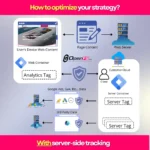The Revolutionary Impact of Generative AI in Digital Marketing
The digital marketing landscape never stands still. Just when you think you’ve mastered the latest trends, something new emerges to shake up everything. That’s exactly what’s happening with generative AI – it’s completely transforming how marketers approach their craft, opening doors to unprecedented efficiency and creativity.
In this rapidly evolving space, generative AI isn’t just another tech buzzword – it’s becoming the backbone of innovative marketing strategies that deliver real results. Let’s dive into how this technology is reshaping digital marketing and why it matters for your business.
Understanding Generative AI in Digital Marketing
Think of generative AI as your always-on creative partner – one that can produce content, design visuals, and even write code at lightning speed. Unlike traditional automation tools that simply follow predetermined paths, generative AI actually creates original outputs based on what it’s learned.
In the marketing world, this means AI algorithms that can craft original blog posts, social media updates, email campaigns, images, and videos that resonate with your audience. It’s not merely about automating repetitive tasks; it’s about unleashing new levels of creativity and strategic execution that were previously impossible to scale.
The quality of AI-generated content has improved dramatically in recent years. Tools like ChatGPT can produce engaging written content while platforms like DALL-E and Midjourney can create stunning visuals that capture attention. And the technology keeps getting better – what seemed impressive yesterday is just the starting point for tomorrow’s capabilities.
How Generative AI is Transforming Digital Marketing Strategies
The impact of generative AI goes far beyond simple automation. It’s fundamentally changing how marketers approach their core activities, from content creation to personalization to optimization.
Content Creation at Unprecedented Scale
One of the biggest challenges for marketers has always been producing enough high-quality content to feed the constant demand from multiple channels. This is where generative AI truly shines.
With advanced AI tools, you can now generate blog posts, social media updates, product descriptions, and even video scripts in minutes rather than hours or days. This doesn’t mean creative professionals are becoming obsolete – quite the opposite. The most successful implementations use AI to handle the heavy lifting while human marketers focus on strategy, refinement, and adding that distinctive brand voice that no AI can fully replicate.
For businesses looking to enhance their search engine optimization efforts, this content scaling capability represents a game-changer. You can now create comprehensive content strategies that would have previously required entire teams of writers.
Hyper-Personalization Becomes Reality
We’ve all heard that personalization drives engagement, but the practical limitations of creating truly personalized content for different audience segments have made this difficult to achieve. Generative AI is removing these barriers.
By analyzing customer data and behavior patterns, AI can now generate tailored content variations for different audience segments – or even individual users. This might include personalized product recommendations, customized email content, or dynamically generated landing pages that speak directly to a visitor’s interests and needs.
The result? Significantly higher engagement rates, better customer experiences, and ultimately, improved conversion rate optimization across your marketing channels.
SEO-Optimized Content Generation
Search engine optimization remains crucial for digital marketing success, but staying on top of ever-changing algorithms and keywords can be exhausting. Generative AI is simplifying this process dramatically.
Modern AI tools can analyze top-performing content for your target keywords, identify semantic relationships and topics, and then generate comprehensive content that’s naturally optimized for search engines. Rather than spending hours on keyword research and content planning, marketers can focus on refining AI-generated drafts and adding unique insights that elevate the content above competitors.
This approach helps businesses boost their rankings more efficiently while maintaining the quality standards that both users and search engines demand.
Practical Applications of Generative AI Across Marketing Channels
The theoretical benefits of generative AI are impressive, but how does this technology translate into practical applications? Let’s explore some specific ways marketers are leveraging AI across different channels.
Revolutionizing Social Media Marketing
Social media demands constant content creation across multiple platforms, each with its own formats and audience expectations. Generative AI is helping marketers meet this challenge head-on:
- Creating platform-specific content that matches the tone and style of each social channel
- Generating eye-catching visuals and graphics that stop users from scrolling
- Suggesting optimal posting times based on audience activity patterns
- Crafting variations of posts for A/B testing to maximize engagement
- Analyzing performance data to continuously refine content strategy
With AI handling these production tasks, social media managers can focus on community building, responding to followers, and developing the strategic direction that no AI can replace.
Transforming Email Marketing Performance
Email remains one of the highest ROI marketing channels, and generative AI is making it even more powerful. Smart marketers are using AI to:
- Craft compelling subject lines that boost open rates
- Generate personalized email content based on recipient behavior
- Create segmented email campaigns at scale
- Optimize send times for individual recipients
- Automatically test different content variations to improve performance
The results speak for themselves: higher open rates, increased click-throughs, and ultimately more conversions from email campaigns that would have been impossible to create manually at scale.
Elevating Ad Performance
Creating effective advertising copy and creative elements has traditionally required specialized skills and extensive testing. Generative AI is democratizing this process while improving outcomes.
AI tools can analyze your product features, target audience demographics, and competitor ads to generate compelling ad copy variations. They can even create multiple versions for testing, helping you identify the messaging that resonates most strongly with different audience segments.
For businesses investing in search engine marketing, this capability can dramatically improve campaign performance while reducing the time spent on creative development.
Navigating Challenges in Implementing Generative AI for Marketing
While the potential of generative AI is enormous, implementing it effectively comes with challenges. Understanding these hurdles – and how to overcome them – is essential for successful adoption.
Maintaining Authentic Brand Voice
One of the most common concerns about AI-generated content is that it might lose the distinctive voice that makes your brand recognizable. This is a legitimate concern, but one that can be addressed through proper implementation.
The key is providing clear guidelines and examples when working with AI tools. Think of it as training a new team member – the more context and examples you provide about your brand voice, the better the output will match your expectations. Additionally, having human editors review and refine AI-generated content ensures it truly reflects your brand personality.
Many marketers find success with a hybrid approach: using AI to generate initial drafts or ideas, then having skilled writers add the final polish that makes the content distinctively “you.”
Avoiding Content That Feels Generic
Another potential pitfall is creating content that technically checks all the boxes but lacks originality or depth. AI systems can sometimes fall into patterns that produce safe but uninspiring content.
To avoid this, regularly update your prompts and input data, and don’t rely exclusively on AI for creative direction. The most compelling content often combines AI efficiency with human creativity – use AI to handle structure and research, then add unique insights, real-world examples, and creative angles that make your content stand out.
As noted in a recent analysis on how AI drives digital marketing, the technology works best when enhancing human creativity rather than replacing it entirely.
Navigating Ethical Considerations
As with any powerful technology, generative AI raises important ethical questions around transparency, data usage, and content authenticity. Responsible marketers need to address these proactively.
Be transparent with your audience about how you’re using AI in your marketing. Ensure your data collection and usage comply with privacy regulations. And always maintain human oversight of AI-generated content to prevent potential issues with accuracy or appropriateness.
The goal isn’t to hide your use of AI, but to leverage it responsibly as part of a thoughtful marketing strategy that respects both your audience and ethical standards.
Integrating Generative AI Into Your Marketing Strategy
Ready to harness the power of generative AI in your marketing efforts? Here’s a practical roadmap to get started:
- Identify opportunity areas: Look for marketing activities that are time-consuming, repetitive, or difficult to scale. Content creation, social media management, and personalization are often good starting points.
- Start with specific use cases: Rather than trying to transform everything at once, begin with one or two specific applications where AI can deliver immediate value.
- Select the right tools: Research AI platforms that specialize in your priority areas. Consider factors like ease of use, customization options, and integration with your existing marketing stack.
- Establish clear guidelines: Develop specific prompts and brand guidelines to ensure AI-generated content aligns with your voice and standards.
- Implement human oversight: Create workflows that include human review and refinement of AI outputs before they go live.
- Measure and optimize: Track the performance of AI-generated content against your marketing KPIs and use these insights to continuously improve your approach.
Remember that successful implementation of generative AI requires balancing automation with human creativity. The most effective strategies combine the efficiency and scale of AI with the strategic insight and emotional intelligence that only humans can provide.
The Future of Generative AI in Digital Marketing
We’re still in the early stages of what’s possible with generative AI in marketing. As the technology continues to evolve, we’re likely to see:
- Even more sophisticated personalization capabilities, potentially creating truly unique experiences for each user
- Advanced AI-generated video content that rivals professionally produced material
- Integration with virtual and augmented reality for immersive marketing experiences
- AI-powered conversational marketing that can engage naturally with customers across multiple touchpoints
- Predictive content creation that anticipates market trends before they become obvious
For marketers who embrace these technologies early and develop expertise in their application, the competitive advantages could be substantial. As digital marketing trends evolve, AI capabilities will increasingly separate market leaders from followers.
Conclusion: Embracing the Generative AI Revolution in Marketing
Generative AI represents much more than just another digital marketing tool – it’s fundamentally changing what’s possible in terms of content creation, personalization, and customer engagement. For businesses willing to embrace this technology thoughtfully, the rewards include greater efficiency, improved marketing performance, and the ability to connect with audiences at a scale previously unimaginable.
The key to success lies not in simply adopting AI for its own sake, but in finding the right balance between technological efficiency and human creativity. The marketers who thrive in this new landscape will be those who use AI to handle routine tasks while focusing their human talent on strategy, creativity, and building genuine connections with their audience.
As we move forward, the question isn’t whether generative AI will transform digital marketing – that transformation is already underway. The real question is how effectively your business will adapt to and capitalize on these changes. The future of marketing is here, and it’s being shaped by the powerful combination of human creativity and AI capabilities.
Frequently Asked Questions About Generative AI in Marketing
Will generative AI replace human marketers?
No – while AI excels at content production and data analysis, it can’t replace human creativity, strategic thinking, or emotional intelligence. The most successful marketing approaches combine AI efficiency with human insight, using technology to handle routine tasks while people focus on strategy and creativity.
How can small businesses benefit from generative AI?
Generative AI is particularly valuable for small businesses with limited resources. It allows you to create high-quality content efficiently, implement sophisticated personalization strategies, and compete with larger companies in terms of marketing output without needing a large team. The key is starting with specific applications that address your biggest marketing challenges.
What are the biggest risks when implementing generative AI?
The main risks include potential loss of brand voice, creation of generic content, and ethical concerns around transparency and data usage. These can be mitigated through clear guidelines, human oversight of AI-generated content, and transparent communication with your audience about how you’re using AI in your marketing.
How does generative AI improve SEO performance?
Generative AI enhances SEO through efficient keyword research, creation of comprehensive content optimized for search intent, generation of content variations for testing, and scaling content production across topics. For best results, combine AI capabilities with human expertise in search engine optimization fundamentals.
 Written by: Romulo Vargas Betancourt
Written by: Romulo Vargas Betancourt
CEO – OpenFS LLC







